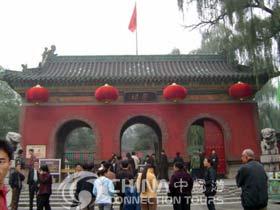 Lying at the foot of the hill is the Jingci Temple (Temple of Pure Mercy) was built by Qian Hongshu in 954, the first year of Xiade of Late Zhou Dynasty in the period of Five Dynasties, to accommodate Monk Yongming, the Founder of Buddhism in China, and it has a history of more than 1,000 years. The temple was first named "Huiri Yongming Temple" and was renamed Jingci Temple in the Southern Song Dynasty, known as the "Four Temples of the West Lake" along with the Lingyin Temple, Zhaoqing Temple and Duiyin Temple. The Jingci Buddhist Monastery used to be as famous as the Lingyin Temple across the lake in the past. It later became one of Zen sect's five major sanctuaries in the South Song Dynasty. The temple used to have a hall of 500 Arhats, the first and only one in China. Many famed Buddhist monks used to stay in the monastery. The Caodong Sect, a quite popular Buddhist sect in Japan, originated in the Jingci Temple. In its history the temple has suffered from serious damages. Today part of it has been repaired, including the temple's gate with the two gate-generals Heng and Ha, the Shrine of Sakyamuni Buddha, the rear hall, and the Belfry. The "Wood-Carrying Well" is a special attraction of the temple. There is a large piece of wood floating on the surface of the water in the well. It was allegedly left by Master Ji when he used his superhuman power to carry wood through the well to build the temple. And the Bell Pavilion, a two-storied highly decorated affair, houses a two-ton bell in stationary suspension. In recent years, Hangzhou celebrities of various trades, foreign guests, overseas Chinese and visitors will gather inside Bell Tower of Jingci Temple and strike the bell to ring out the Old Year and ring in the New Year on New Year s Eve of lunar calendar. When the 108th stroke is made, it means that the very beginning of a New Year is coming. In this way, the ancient bell gives out new sound for the ever-growing new era. This activity of striking bell at New Year s Eve, which symbolizes harmony, happiness, stability and unification, adds new meaning to ancient Evening Bell Ringing at Nanping Hill and makes it even more appealing.
Lying at the foot of the hill is the Jingci Temple (Temple of Pure Mercy) was built by Qian Hongshu in 954, the first year of Xiade of Late Zhou Dynasty in the period of Five Dynasties, to accommodate Monk Yongming, the Founder of Buddhism in China, and it has a history of more than 1,000 years. The temple was first named "Huiri Yongming Temple" and was renamed Jingci Temple in the Southern Song Dynasty, known as the "Four Temples of the West Lake" along with the Lingyin Temple, Zhaoqing Temple and Duiyin Temple. The Jingci Buddhist Monastery used to be as famous as the Lingyin Temple across the lake in the past. It later became one of Zen sect's five major sanctuaries in the South Song Dynasty. The temple used to have a hall of 500 Arhats, the first and only one in China. Many famed Buddhist monks used to stay in the monastery. The Caodong Sect, a quite popular Buddhist sect in Japan, originated in the Jingci Temple. In its history the temple has suffered from serious damages. Today part of it has been repaired, including the temple's gate with the two gate-generals Heng and Ha, the Shrine of Sakyamuni Buddha, the rear hall, and the Belfry. The "Wood-Carrying Well" is a special attraction of the temple. There is a large piece of wood floating on the surface of the water in the well. It was allegedly left by Master Ji when he used his superhuman power to carry wood through the well to build the temple. And the Bell Pavilion, a two-storied highly decorated affair, houses a two-ton bell in stationary suspension. In recent years, Hangzhou celebrities of various trades, foreign guests, overseas Chinese and visitors will gather inside Bell Tower of Jingci Temple and strike the bell to ring out the Old Year and ring in the New Year on New Year s Eve of lunar calendar. When the 108th stroke is made, it means that the very beginning of a New Year is coming. In this way, the ancient bell gives out new sound for the ever-growing new era. This activity of striking bell at New Year s Eve, which symbolizes harmony, happiness, stability and unification, adds new meaning to ancient Evening Bell Ringing at Nanping Hill and makes it even more appealing.
